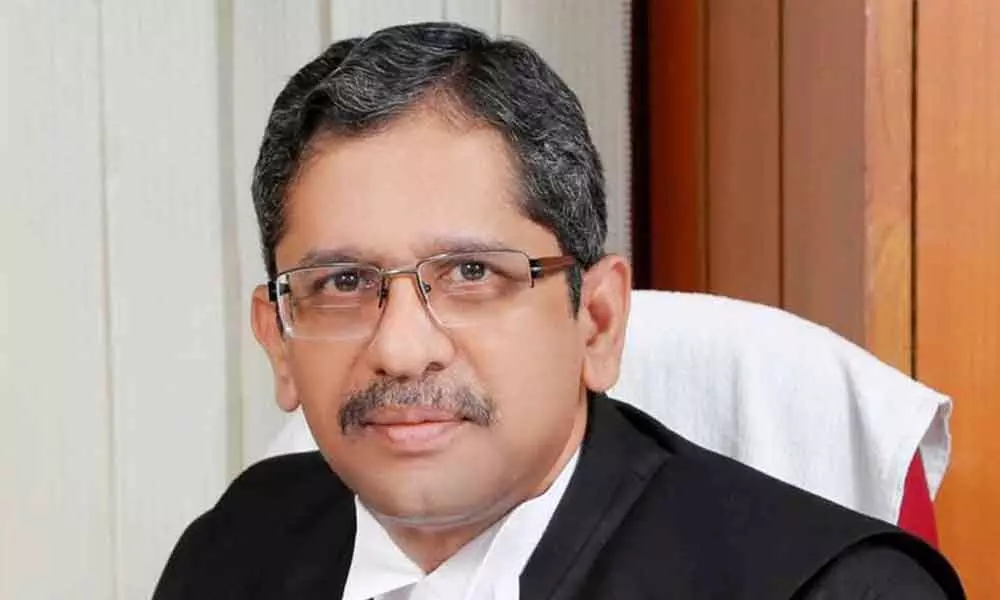Live
- Telugu cinema rings in 2025 with the re-release of classic hits
- Shanaya stuns in a chic white dress
- Love, laughter, and togetherness
- A year of cinematic excellence
- Indian Players Mourn Former Prime Minister Manmohan Singh’s Death
- AI's Leap Forward: 2024 Milestones and the Transformative Promise of 2025
- YS Jagan mourns over demise of former PM Manmohan Singh
- Resonance Global Celebrates Stellar Achievements in SAT and IELTS 2024
- Amjad Habib Launches Hairstyle Training Academy in Hyderabad
- Little Flower High School Hosts Spectacular Fiesta cum Annual Day 2024-2025
Just In
Tight-rope walk for judges, more so for a Supreme Court judge, says CJI Ramana


Chief Justice NV Ramana (File/Photo)
Chief Justice N.V. Ramana on Wednesday said the process of decision-making goes beyond the knowledge and application of principles of law, as he emphasised how judges are often caught in the dilemma of morality versus legality, in the quest to deliver justice.
New Delhi: Chief Justice N.V. Ramana on Wednesday said the process of decision-making goes beyond the knowledge and application of principles of law, as he emphasised how judges are often caught in the dilemma of morality versus legality, in the quest to deliver justice.
In his remarks at Supreme Court judge, Justice Navin Sinha's virtual farewell function, organised by Supreme Court Bar Association, he cited a quote: "Doing the right thing is not the problem. Knowing what the right thing is, that's the challenge."
"We judges are often caught in the dilemma of morality versus legality, in our quest to deliver justice. There are multiple sleepless nights, that we go through to resolve such issues. It is often a tight-rope walk, more so, for a Supreme Court judge. After all, the Supreme Court is the final arbiter."
Chief Justice Ramana emphasized the process of decision making goes beyond the knowledge and application of principle of law. "It needs moral courage to render an opinion which might displease many. It is imperative for judges not to be swayed by these external pressures", he said.
He noted that impartiality is not an easy quality to possess or apply to the cases before them.
"We often carry our individual baggage, our biases and prejudices which can unconsciously affect the decision-making process. Our social conditions, upbringing and life experiences often colour our opinions and notions. But, when we adorn the robe of a judge, we must make a conscious effort to cast aside our biases and prejudices," said the CJI, adding equality, objectivity and even-handedness form crucial aspects of fairness.
He stressed judges must not forget the social dimensions that is at the heart of every case before us. "This is our sacred duty and a burden that we bear gladly," he added.
Justice Sinha was elevated to the top court on February 17, 2017. During his tenure, he penned 114 judgments on diverse topics including intellectual property, criminal law, and many more. He has disposed of over 13,671 cases in the Supreme Court.
In his farewell speech, he emphasised on training young lawyers to benefit both the bar and the bench. "Humility lies in recognising one's own shortcoming and address it. In today's time when competition is stiff and laws are tough, I believe younger generation of lawyers need to be trained," said Justice Sinha.
He further added that young lawyers must be taught manner and demeanour of a lawyer. "When the lawyer appears, a judge should be able to trust him..," Justice Sinha said.

© 2024 Hyderabad Media House Limited/The Hans India. All rights reserved. Powered by hocalwire.com






